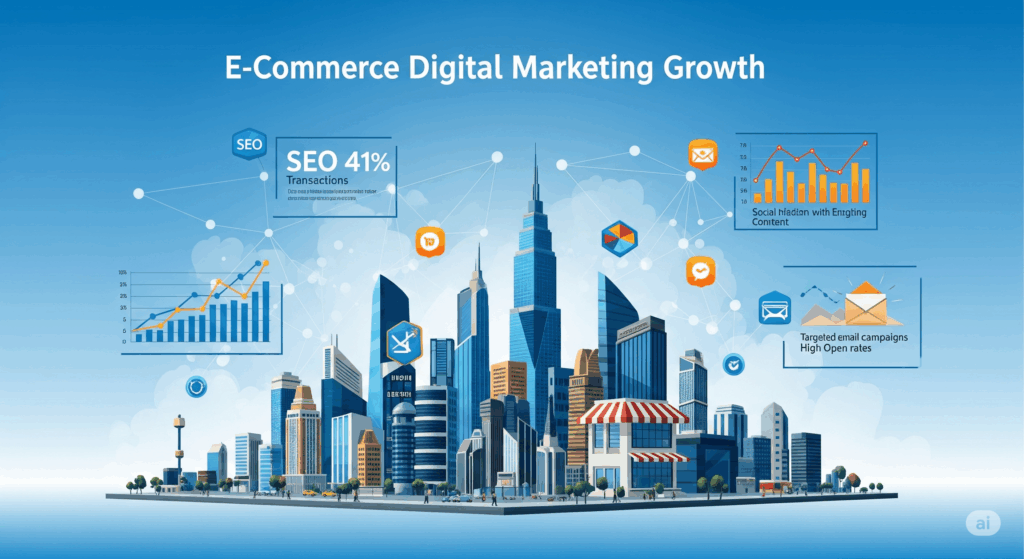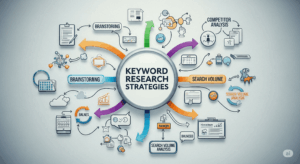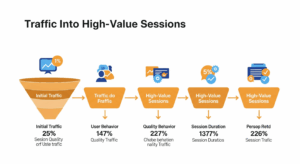Ever feel like your e-commerce digital marketing efforts are spread across a dozen different tabs, each demanding your attention? You’re not alone. In the fast-paced world of online retail, managing everything from customer relationships to ad campaigns can feel like juggling flaming torches. The secret to truly scalable growth isn’t just about having some tools; it’s about having the right tools that work together as a seamless, integrated e-commerce marketing stack.
This isn’t just a list of popular software. Consider this your practical guide to building a cohesive, powerful digital marketing ecosystem specifically designed for e-commerce success. We’ll dive into essential tool categories, offer insights into popular options, and crucially, explore how to integrate them to create a workflow that actually helps your business thrive.
The Foundation: Your Central Customer Hub (CRM Platforms)
For e-commerce, your Customer Relationship Management (CRM) platform isn’t just for sales teams; it’s the heart of your customer data. It’s where you track interactions, purchase history, and customer preferences. A good CRM provides a unified view of your customers, enabling personalized marketing and superior service.
Why it matters for E-commerce: Understanding customer segments, managing loyalty programs, tracking customer service interactions, and personalizing future marketing efforts.
Key considerations: Look for e-commerce specific integrations with your store platform (like Shopify or WooCommerce). You’ll want robust segmentation capabilities and automation features.
Tool Insights:
- ActiveCampaign: While known for email marketing, ActiveCampaign offers strong CRM capabilities with excellent e-commerce integrations. It allows you to automate workflows based on purchase behavior, abandoned carts, and customer lifecycle stages. It’s a great choice for businesses looking for an integrated email and CRM solution.
- Klaviyo: This isn’t a traditional CRM, but it acts like one for e-commerce, focusing on robust customer profiles built from transactional data. Its deep integration with Shopify and other platforms makes it incredibly powerful for segmenting customers based on purchase history, website activity, and more. It’s a marketing automation powerhouse.
- Salesforce Essentials/Small Business Solutions: If your e-commerce business also has a B2B component or a complex sales process, Salesforce offers scalable CRM solutions that can integrate with e-commerce platforms, providing a comprehensive view of both B2C and B2B customer journeys.
Integration Strategy: Your CRM should ideally be the central data repository, feeding customer insights to your email marketing, social media advertising, and analytics tools.
Nurturing Relationships: Email Marketing Software
Email marketing remains one of the highest ROI channels for e-commerce. From abandoned cart recovery to loyalty programs and new product announcements, effective email communication is essential.
Why it matters for E-commerce: Driving repeat purchases, reducing cart abandonment, announcing promotions, personalizing customer journeys, and building brand loyalty.
Key considerations: Look for robust segmentation, automation flows (welcome series, abandoned cart, post-purchase), A/B testing capabilities, and excellent integration with your CRM and e-commerce platform.
Tool Insights:
- Klaviyo (again!): As mentioned, Klaviyo excels here. Its deep e-commerce integrations allow for highly personalized and automated email flows based on real-time customer behavior. It’s built for segmenting customers based on past purchases, Browse activity, and more, making personalization effortless.
- MailerLite: A great option for growing e-commerce businesses looking for user-friendliness and strong automation without a huge price tag. It offers intuitive drag-and-drop builders and good segmentation.
- Omnisend: Specifically designed for e-commerce, Omnisend offers email, SMS, and web push notifications in one platform. Its pre-built e-commerce automation workflows (like abandoned cart series) are highly effective.
Integration Strategy: Seamless integration with your e-commerce platform (Shopify, WooCommerce, etc.) is paramount for triggering automated emails. Integration with your CRM allows for richer customer data to inform personalization.
Visibility is Key: SEO Tools for E-commerce
Even with amazing products, if customers can’t find you, you can’t sell. E-commerce SEO is about optimizing your store and product pages to rank high in search results, driving organic traffic and potential sales.
Why it matters for E-commerce: Driving organic traffic, increasing product visibility, outranking competitors, and understanding customer search intent.
Key considerations: Keyword research capabilities (especially for product-focused keywords), competitor analysis, technical SEO auditing (crawlability, indexability), and on-page optimization suggestions.
Tool Insights:
- Semrush: A comprehensive suite offering robust keyword research, competitive analysis, site auditing (critical for finding e-commerce specific technical issues like duplicate content), and backlink analysis. It’s fantastic for finding product-specific keywords and understanding your competitors’ strategies.
- Ahrefs: Another industry leader, Ahrefs is exceptional for competitor analysis, backlink research, and content gap analysis. It helps you identify high-ranking product pages from competitors and discover opportunities.
- Screaming Frog SEO Spider: A desktop program that crawls your website and identifies common SEO issues like broken links, duplicate content, and missing meta descriptions, which are prevalent in e-commerce sites with many product pages.
Integration Strategy: SEO tools don’t directly integrate with your e-commerce platform in the same way as a CRM. Instead, they provide data and insights that you then implement within your e-commerce platform’s backend (e.g., product descriptions, meta tags) and via your content strategy.
Driving Instant Sales: PPC Management Platforms
Paid advertising (PPC), especially on platforms like Google Ads and Meta Ads, is crucial for driving immediate traffic and sales to your e-commerce store. Managing these campaigns efficiently is key to a positive ROI.
Why it matters for E-commerce: Immediate traffic generation, targeting specific audiences, promoting new products, scaling sales quickly, and re-engaging past visitors (retargeting).
Key considerations: Budget management, ad creation and optimization, targeting capabilities, and detailed performance reporting.
Tool Insights:
- Google Ads & Meta Ads Managers: These are the native platforms and essential for running campaigns on their respective networks. While you can use third-party tools, direct knowledge of these interfaces is fundamental.
- Optmyzr / Adalysis: These tools provide advanced insights and automation for Google Ads campaigns, helping you optimize bids, identify negative keywords, and refine ad copy for better performance. They’re great for getting more out of your existing ad spend.
- Smartly.io (for larger e-commerce): An enterprise-level platform specifically for automating and scaling Meta (Facebook/Instagram) ad campaigns. It excels at dynamic creative optimization and personalized ad delivery based on product feeds.
Integration Strategy: Your PPC platforms should integrate with your e-commerce platform for seamless product feed management and accurate conversion tracking. Integrating with your CRM (via pixels/tags) allows for advanced audience targeting and retargeting based on customer data.
Building Brand & Community: Social Media Management Tools
For e-commerce, social media isn’t just about posting pretty pictures. It’s about building a brand community, engaging with customers, driving traffic, and even facilitating direct sales.
Why it matters for E-commerce: Brand building, customer engagement, driving traffic to product pages, customer service, and direct social selling.
Key considerations: Scheduling capabilities, content creation features, engagement monitoring, and analytics for audience growth and post performance.
Tool Insights:
- Buffer / Hootsuite: Excellent for scheduling posts across multiple platforms, monitoring mentions, and analyzing basic performance. They streamline the process of maintaining a consistent social presence.
- Sprout Social: Offers more advanced features for customer service integration, social listening, and detailed analytics, ideal for e-commerce brands that prioritize social engagement and brand monitoring.
- Later (especially for visual brands): Strong emphasis on Instagram planning and scheduling, making it perfect for fashion, beauty, or home goods e-commerce brands.
Integration Strategy: Social media tools can integrate with your e-commerce platform for direct product tagging or with your analytics dashboard to track traffic and conversions originating from social channels.
The Nerve Center: Analytics & Business Intelligence Dashboards
You can have all the tools in the world, but if you can’t understand your data, you’re flying blind. A robust analytics dashboard is crucial for pulling all your data together and revealing insights into customer behavior, marketing performance, and overall business health.
Why it matters for E-commerce: Understanding customer journeys, identifying top-performing products/channels, optimizing marketing spend, and making data-driven business decisions.
Key considerations: Customizability, data visualization capabilities, integration with all your other marketing and sales platforms.
Tool Insights:
- Google Analytics 4 (GA4): The foundational analytics platform. GA4’s event-driven model is perfect for e-commerce, allowing you to track specific customer journeys, conversions, and product interactions across your site and apps.
- Looker Studio (formerly Google Data Studio): A free tool for creating custom, interactive dashboards by pulling data from GA4, Google Ads, Meta Ads, and other sources. This allows you to visualize your entire e-commerce performance in one place.
- Tableau / Power BI (for larger teams): More advanced business intelligence tools offering deep data analysis and visualization for complex datasets, suitable for larger e-commerce operations with dedicated data analysts.
Integration Strategy: This is where everything converges. Your analytics dashboard should pull data from your e-commerce platform, CRM, email software, PPC platforms, and social media tools to give you a holistic view of your marketing efforts and their impact on your e-commerce ROI.
Weaving It All Together: The Power of Integration
The true magic of an e-commerce digital marketing stack lies in how these tools integrate.
- Data Flow: Ensure customer data from your e-commerce platform flows seamlessly into your CRM and email marketing software.
- Conversion Tracking: Set up robust conversion tracking across all your advertising platforms, linked back to your analytics dashboard.
- Audience Syncing: Sync customer segments from your CRM or email platform to your advertising platforms for highly targeted ad campaigns.
- Automated Workflows: Use integrations to create automated sequences – an abandoned cart in your store triggers a personalized email, or a new customer is automatically added to a loyalty segment in your CRM.
Investing in an integrated marketing stack isn’t just about spending money on software; it’s about investing in efficiency, smarter decision-making, and ultimately, sustainable growth for your e-commerce business. By choosing tools that complement each other and building strong integration strategies, you’ll transform your digital marketing from a scattered effort into a finely tuned growth engine.







